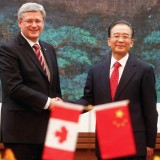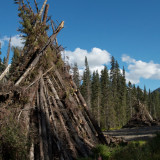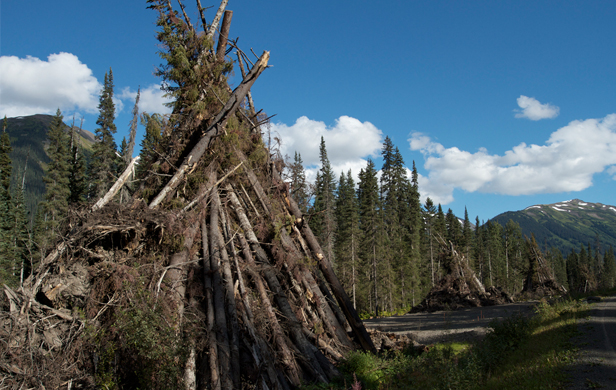There is good news in the environment field and, for some reason the Fraser Institute-driven Vancouver Sun won’t talk about it Continue reading Cancellation of Private Power Project in Kootenays a Victory for Citizens, Bull Trout


There is good news in the environment field and, for some reason the Fraser Institute-driven Vancouver Sun won’t talk about it Continue reading Cancellation of Private Power Project in Kootenays a Victory for Citizens, Bull Trout

Gen Why Media and the Canadian Centre for Policy Alternatives are co-hosting an “intergenerational dialogue” in Vancouver on Tuesday, December 11 to explore various existing and proposed energy projects in Western Canada. Titled “Power & Energy: Connecting the Dots”, the program is the third in a series of “Bring Your Boomers” events, sponsored by Vancity, designed to debate key social issues from different generational perspectives.
In addition to musical performances and a keynote talk by the CCPA’s Marc Lee, the evening will feature a three-way dialogue, with each panelist representing a different generation. I have the privilege of representing Generation Y (a.k.a. “Millennials” – born from the late 1970s to early 2000s), while leading energy and public policy expert Ben Parfitt of the CCPA will represent Generation X. Rounding out the panel is Boomer Karen Cooling, National Staff Representative at the Communications, Energy and Paperworkers Union of Canada. Adding further generational depth to the discussion will be 11 year-old moderator and First Nations singer/songwriter Ta’Kaiya Blaney – a vocal critic of oil tankers on BC’s coast.
Cooling’s union represents workers in the energy sector, among other areas, and has actively raised concerns about proposed oil pipelines to export Alberta bitumen to Asia and the United States. Her colleague, union president Dave Coles, recently told a crowd of thousands gathered in Victoria to oppose pipelines and takers in BC, “these pipelines are job killers” because they export bitumen without refining it and threaten the environment.
Ben Parfitt has published a number of highly-regarded independent reports on hydraulic fracturing, or “fracking”, in BC. Fracking is also a key focus of a film I’m currently co-directing with Gen Why co-founder Fiona Rayher, called Fractured Land, which examines energy issues in northern BC and Alberta through the eyes of a young First Nations law student named Caleb Behn. The film will discuss the concept of the “Carbon Corridor” – an interconnected web of fracking and tar sands projects, dams, coal mines, oil, gas and condensate pipelines, and Liquefied Natural Gas (LNG) plants and tankers on BC’s coast – designed to transform Canada into a major hydrocarbon provider to new markets in Asia.
Founded in Vancouver in 2010, Gen Why Media describes itself as “a production group that collaborates across disciplines to create media, events, workshops, public art and intergenerational dialogues that engage society in new forms of public engagement.” Says Tara Mahoney, Gen Why co-founder and organizer of Tuesday’s event, “Our goal with this dialogue is to engage a broader audience in a discussion about energy policy – a topic that isn’t always very accessible, particularly to young people. We hope to use culture as an entry point into a conversation about energy policy and to find ways different generations can work together to shape these issues going forward.”
Gen Why’s previous “Bring Your Boomers” events have examined topics such as technology, globalization, activism and intergenerational cooperation and featured an impressive list of speakers – including former National Chief of the Assembly of First Nations Phil Fontaine, journalist and activist Judy Rebick, filmmakers Nettie Wild and Nimisha Mukerji, Vision Vancouver Councillor Andrea Reimer, and LeadNow.ca Executive Director Jamie Biggar.
Tuesday’s “Power & Energy” dialogue will also feature a musical performance by popular Vancouver band Brasstronaut. The event takes place at the Rio Theatre – 1660 East Broadway, adjacent to Commercial-Broadway Skytrain Station. Door open at 6:30 and the event starts at 7 pm. Tickets can be purchased online here.

The Campbell/Clark government is corrupt and here are a few of the reasons I say this:
Readers will, no doubt, find other reasons.
In recent weeks we discovered Rich Coleman taking election funds from a brewery he is now about to save $9 million in taxes.
Let me tell you about the standards that prevailed in my years (1975-81) in the Bill Bennett government. And, I must say, in the Barrett government before it. Now, mark you, I’m not talking about what policies they supported but the integrity of the premier and his ministers.
I had Coleman’s job and the first thing I did was check my small RRSP and found I had a few shares in Hiram Walker Distillers, which I promptly sold at a small loss.
Of more importance, in 1978 I was greeted by a headline in the morning paper alleging that I had interfered in a hearing before the Rentalsman (the arbiter for rental disputes at the time) who came under my ministry. There wasn’t a particle of truth in it but the Premier gave me 48 hours to deal with it.
It transpired that a judge, hearing an appeal from a decision by the Rentalsman, heard a witness say she had “heard that the minister himself got involved in the case”.
The Rentalsman publicly said that I had had nothing to do with it and had never interfered with his office. I hired a lawyer, now Supreme Court Justice, who within the time limit prevailed upon the judge to withdraw his remarks and say outright that there was no evidence at all that I had even known about the matter let alone interfered in it.
My seat in cabinet was jeopardized, quite properly, by those two matters.
When Minister Jack Davis was being investigated for fraud the Premier promptly sacked him. The standard is not, you see, reasonable doubt but “is the minister under a cloud of reasonable suspicion?” This principle, one of the foundations of democracy, is not well known to the public nor, it seems, to the Campbell/Clark government.
What has this got to do with environmental matters?
Plenty for this government is going to represent us on pipeline matters, tanker matters and many other concerns we all have about our environment.
The killing of the HST has involved the premier trying to make the best possible deal with the feds when the tax expires just a month before the next election.
Thus the essential question arises: When the feds approve the various pipelines proposed without even the usual sham of an environmental assessment process, what will Premier Clark be doing? Will she, in fact, take favours from the feds and promise not to interfere in return? Indeed, has she already done this?
Are she and her ministers going to fold and do as their federal masters demand in fear of recriminations?
There are some, no doubt, who say that the feds should have their way as they speak for all Canada. That ignores the very principle under which Canada governs itself – namely a division of powers under the Constitution Act (1982), which follows the BNA Act (1867), which underlies a federal state as is the case in Germany, Australia and the USA.
Prime Minister Harper is no doubt going to approve these pipelines and the consequent tanker traffic using the omnibus clause giving him that right under section 91 – “Works connecting provinces; beyond boundaries of one province; within a province but to the advantage of Canada/or more than one province”.
The province retains a number of powers it can use such as the right to issue licenses – especially water licenses – to protect wildlife, including non-migratory fish and to protect its shoreline.
Will Premier Clark have the courage of our convictions and say, “Prime Minister, these pipelines will be subject to our rights to protect our environment under Section 92 and they will be rigorously enforced?”
Or will there be under the table “deals” made linking pipelines and tankers to other issues between Ottawa and Victoria? Such as the HST? Such as selling our constitutional rights for money from Ottawa’s share of royalties and other taxes collected?
There is no middle ground – just as a woman can’t be a “little bit pregnant”, we either stand up for our environment or we don’t.
In short – forgive the expression – will she have the balls to stand up to the feds or, more likely, will she and her ministers try to find some middle ground?
What we need is an honest government of honest men and women protecting us against the predations of greedy corporations, the government of China and the raw uninhibited capitalism of Prime Minister Harper and his toadies from BC.
Clearly, standing up for our rights and honest dealings based on principles is not this government’s strong suit.

Damien Gillis appeared recently on Nanaimo’s CHLY Radio to discuss a number of key political and energy issues in Canada. Gillis and host Rae Kornberger of A Sense of Justice cover the controversial proposed Canada-China trade deal and how that relates to energy and environmental issues in BC particularly. Included amongst these is natural gas fracking in northeast BC and the enormous volumes of fresh water required for these operations. Listen to the interview in two parts – as well as one highlight clip dealing with proposed water licences for fracking. (recorded Nov. 28, 2012)
Highlight Clip: Water Licences for Fracking (6 min)
Full Interview – Part 1: Chinese FIPA
Full Interview – Part 2: Water, Fracking and Fort Nelson First Nation
Read this op-ed in the Vancouver Sun by Ben Parfitt of the Canadian Centre for Policy Alternatives and renowned geologist and energy expert David Hughes, calling into question the BC Liberal Government’s policy for dramatically expanding natural gas development. (Nov. 14, 2012)
British Columbia is no petro state. So why do our political leaders insist that we are a global energy power?
At the University of Calgary last month, Premier Christy Clark boldly asserted that B.C. could one day export four trillion cubic feet of natural gas per year, an amount that would put us on par with the output of Alberta’s oilsands industry.
Clark also said that over the next 30 years such exports “could add over a trillion dollars” to our province’s gross domestic product.
These sound like impressive numbers. But drill into them a bit, and they appear to be overstated, which raises critical questions.
What does exporting four trillion cubic feet of gas per year from B.C. actually mean, when viewed against what we have? What would the economic, energy security and climate consequences be of producing all that gas and more?
Consider the following facts.
Last year, B.C. produced a record 1.2 trillion cubic feet of natural gas — among the most water-depleting and energy-draining gas on earth, due to the deployment of highly controversial fracking technology.
The bulk of that gas went to Alberta to assist in the most water-depleting and energy-draining oil production on Earth. The next biggest slice went to the United States. What was left we used here in the province.
Presumably, we would not simply shut off the taps on these markets in the event that five new liquefied natural gas (LNG) terminals are built on our coast, and we begin shipping four trillion cubic feet of our gas to China, Japan and elsewhere. The government’s energy policies would therefore see gas extraction rates quintuple in northeastern B.C. — and probably a whole lot more because natural gas will likely be burned to power all those LNG plants.
What not enough of us have asked the government about is what such policies mean in terms of depleting our non-renewable fossil fuel resources and undermining our ability to meet our legislated greenhouse gas emissions reduction targets.
Now is the time to do so. Here’s why.
According to British Columbia’s Oil and Gas Commission, our current reserves of natural gas total roughly 33 trillion cubic feet. Based on our premier’s projections of 4 trillion cubic feet per year of gas exports, we’d drain our entire reserves in just 8 years, or less if we continued to supply our own needs and those of our existing customers.
Now the likelihood is that we have far more gas. Estimated total resources for B.C. exceed 1,200 trillion cubic feet. But even optimistically assuming we can successfully extract one quarter of those resources, we’d be completely out of gas in 75 years — that is if we exported it all and left nothing for ourselves or for our neighbours.
Speaking of neighbours, Alberta’s Energy Resources Conservation Board projects a 35 per cent decline in its own gas production over the next decade. And according to Canada’s National Energy Board, total Canadian natural gas production is down nearly 20% today from its peak in 2002.
The only western Canadian jurisdiction whose reserves and production show growth is here in B.C. And our elected leaders’ vision is that we rush whatever we have out of the country.
Premier Clark and B.C. Energy Minister, Rich Coleman, call their gas export plans a “strategy”. Their choice of wording is an insult both to the English language and to basic economics.

The Jumbo Ski Resort planned for the Purcell Mountains has been approved by the provincial government, which has put in place legislation for the area to become a municipality.
The setting up of a municipality is so the government will have someone to work with as the various permits are dealt with (which is Liberalese for “approved”).
The irony, nay hypocrisy, of this seems to have been lost in the debate. This is nothing short of gerrymandering, for there already is a municipality to deal with – namely the several communities in the Kootenays which will be affected by this project This is a refinement of gerrymandering.
This technique came about when a Massachusetts governor, Elbridge Gerry, redrew an election district to suit his political needs. It looked like a salamander so the term gerrymandering entered the political lexicon.
At least there were real people living in Gerry’s new bounderies.
The obvious question here is, do people in the vicinity of developments have any say in the matter? They will be just as involved in, say, Nelson, as if the development were inside their city boundaries – yet they have nothing to say on whether or not the project should be approved.
Well, not quite nothing, as we shall see.
This is eerily similar to the Ashlu River private power project in the mid-2000s. The proposal was to develop a dam on the river and make electricity. One of the main opponents was Tom Rankin, a rancher through whose property the Ashlu flows. Tom went on to form the Save Our Rivers Society, for which Damien Gillis and I worked the 2009 provincial election.
The regional district held public hearings around the district and learned that the various communities massively opposed this project. The Regional District voted down the proposal 8-1, so the Campbell government passed an amendment to the Municial Act, known as Bill 30, eliminating the right of any municipality to deny a private power licence.
Incidentally, it is of interest to know about the Ashlu that environmentalists claimed that it would – forgive the techical term – bugger up the fish runs returning to spawn.
The company stoutly denied this.
It turned out that the environmentalists were spot on – a marvelous salmon river all but gone.
Now, I alluded (above) that the public will have a chance to say their piece. They will – there will be public meetings to find out what environmental safeguards should be put in place.
The public will have no say as to whether or not there should be the development in the first place – thanks to the Campbell/Clark government the project is a “done deal”.
The opposition to this development is not all from tree huggers by any means. In fact, the diminishing grizzly bears will be further diminished by this project as will other wildlife.
Indeed, government scientists have spoken on this:
“The proposed Jumbo Glacier Resort has the potential for substantial and direct cumulative impacts to the Central Purcell Grizzly Bear population.”
– BC Ministry of Water Land and Air Protection, 2004
“…there will be a substantial impact to grizzly bear habitat effectiveness, mortality risk, and most importantly, the fragmentation of grizzly bear distribution…”
– Matt Austin, Large Carnivore Specialist, Biodiversity Branch, Government of B.C
Nothing anyone can say – not even the most prominent scientists in the world can make a difference – the project has been approved and the appropriate municipality set up, all nice and legal-like.
There is an election coming up in May and what the people are entitled to know is whether or not the NDP would restore to local bodies the right to be heard and listened to when large projects with sensitive environmental issues are involved.
Over to you, Mr Dix.

Watch these timelapse animations of recent water withdrawals and industrial activity in Fort Nelson First Nation traditional territory for natural gas hydraulic fracturing. These short term licenses were all issued without public or First Nations consultation. Courtesy of FNFN Lands Dept. and mapper Bobby Concepcion.
Read this story from the Globe and Mail on US energy firm Lone Pine Resources’ forthcoming NAFTA challenge regarding lost economic opportunities resulting from Quebec’s ban on natural gas hydraulic fracturing. (Nov. 15, 2012)
A U.S.-incorporated energy firm, Lone Pine Resources Inc., is taking on Quebec’s stand against fracking, saying it violates the North American free-trade agreement and demanding more than $250-million in compensation.
Lone Pine Resources Inc., headquartered in Calgary but incorporated in Delaware, disclosed in a filing with the U.S. Securities and Exchange Commission this week that on Nov. 8, it filed a notice of intent to sue the Canadian government under NAFTA’s controversial Chapter 11.
Those provisions of the trade treaty allow U.S. and Mexican companies to sue Ottawa if they feel they have been wronged by a government policy or action.
Lone Pine is just one of many major natural gas companies affected by Quebec’s moratorium on hydraulic fracturing, or fracking, which involves injecting liquids deep into the ground. Fracking has been controversial over fears for its effects on the environment and drinking water, and has been banned in several European countries. The industry says that done properly, it is safe.
According to Lone Pine, Quebec passed legislation last June that, in addition to the moratorium, also completely cancelled permits for oil and gas activity in areas directly below the waters of the St. Lawrence River – including the revoking of a permit held by Lone Pine covering 33,460 acres.”
Company spokesman Shane Abel said in an interview that Quebec’s legislation denies the company any compensation for the loss of its permit.
“We think that the expropriation is arbitrary and without merit,” he said. “… We think that’s a clear violation of the NAFTA agreement.”
The NAFTA challenge, levelled at a major environmental policy, is fuel for critics of trade deals who are now attacking Canada’s proposed investor-protection agreement with China, which would extend similar rights to Chinese investors in Canada.
“It contradicts everything the government has said about the China investment treaty, about it having no impact on the environment and there being no threats to non-discriminatory environmental measures,” said Stuart Trew, trade campaigner with the Council of Canadians.
Read this story by Mark Hume in the Globe and Mail on Fort Nelson First Nation’s concerns about long-term water withdrawal licence applications for shale gas development in their territory in northeast BC. (Nov. 13, 2012)
Kanute Loe, an elder with a small native band in northeast British Columbia, measures the impact of the gas industry on the environment by looking at the water levels dropping in the streams and rivers he fishes.
“I spend a lot of my time in the bush. I travel the rivers … there’s creeks that there’s no water coming out of,” he said Tuesday.
“All of a sudden we’re having trouble catching fish … Our rivers are getting harder to navigate … it’s almost like somebody drilled a hole in the bottom of the bathtub,” Mr. Loe said in Vancouver at a news conference to express aboriginal concerns about increasing water extraction by industry.
Sharleen Wildeman, chief of the Fort Nelson First Nation, said her band has grown alarmed at the growing needs of the gas industry, which draws water from streams, lakes and rivers. The water is mixed with sand and chemicals in a slurry that is injected deep under ground. The process, known as hydraulic fracturing or fracking, breaks up shale structures and releases gas deposits.
Ms. Wildeman, whose 800-member band is located near the booming Horn River gas fields, said industry in that area has 20 long-term water licence applications before the B.C. government. If those licences are approved, she said, it would authorize industry to withdraw “tens of billions of litres of water annually” for up to 40 years, for use in fracking operations.
“We are extremely concerned about a massive giveaway of water from our rivers and lakes, without any credible process identifying what the long-term impacts will be,” she said.
Ms. Wildeman is upset with a government consultation process “that has stalled,” and she said the band is demanding five conditions be met before any new water licences are approved.
She said the band wants baseline environmental studies done before licences are issued; multi-year development plans filed in advance to identify proposed water sources, gas-well sites, roads and camps; environmental plans that cap water withdrawals at ecologically acceptable levels; protection of culturally significant land and water resources, and an agreement that environmental impact monitoring and enforcement will be done by an independent body.
“Failure to embrace these fundamental reforms will lead to increasing yet avoidable conflict,” Ms. Wildeman said.


Read this story from CBC on the slashing and burning of thousands of trees by BC Hydro for the construction of its Northwest Transmission Line north of Terrace. (Nov. 7, 2012)
BC Hydro is warning people living northwestern B.C. of smoke haze in that area as they cut down and burn hundreds of kilometres of timber to make way for the Northwest Transmission Line.
The utility’s transmission line project connects an existing substation near Terrace, B.C. and a new substation to be built further north, near Bob Quinn Lake, in 2014.
“In clearing the right of way there’s a lot of woody debris that has to be disposed of. And we do have approval… to dispose of that by burning,” said BC Hydro spokesperson Lesley Wood.
Wood said she didn’t know the total volume of the wood being burned, only that it is considerable.
“When you considering that you’re clearing a right of way up to 80 meters worth of clearing for 340 kilometers — it’s a lot,” she said.
Wood says it isn’t economically viable to use the trees for biofuel or firewood, but says the Nisga’a nation, one of the groups contracted to do the cut and burn, may try to sell some of the timber.
Cariboo North MLA Bob Simpson says the clearing is likely one of the biggest timber cuts in B.C. in 2012.
“This order of magnitude of slash and burn is certainly going to increase B.C.’s contribution to greenhouse gas emissions. When is this province going to get involved in bioenergy, biodigesting in a bigger way so we never have these circumstances?” said Simpson.
“It’s a misuse of a public resource.”
Sharon Glover, the CEO of B.C. Professional Foresters, said there’s no need to be burning the timber — that some of it is bound to be salvageable.
“To say that the forest , ‘We’ll just burn it because it’s not our problem, it’s in our way,’ we need to think differently. If you just burn it you’re saying that timber has no use to anyone. And we just don’t buy it.
“We suspect in the mix of that timber that some of it is going to be merchantable, usable as saw logs, and other timber might be used for bioenergy, shipped to pellet plants or shipped to biomass projects.”